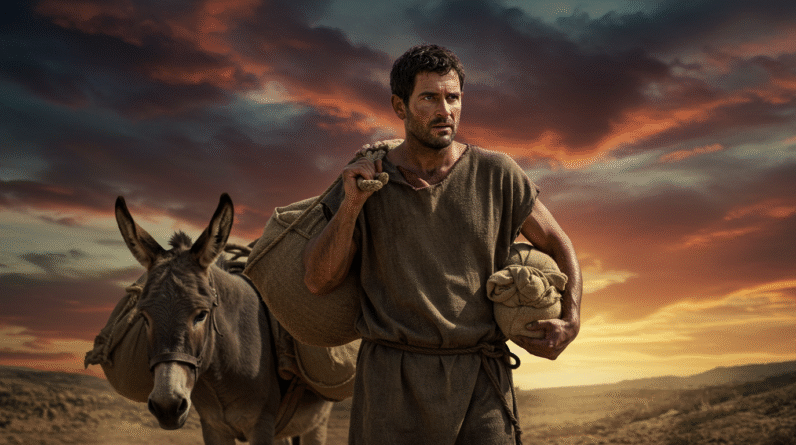Delve into the dual roles of Erastus in Romans 16:23. Discover the balance of civic duty and faith, offering timeless lessons on integrity and quiet influence.
The Role of Erastus: Insights from Romans 16:23
Erastus, a figure sometimes overlooked in the vast tapestry of biblical narratives, holds a quiet yet significant place in the early Christian church. His mention in Romans 16:23 offers a glimpse into a life intertwined with both public service and dedication to the fledgling Christian community. Within this singular verse, we are introduced to Erastus as a man whose roles straddle civic duty and spiritual commitment.

Introduction
Imagine a life balanced on the threshold of two worlds: one of civic responsibility and the other of spiritual devotion. Erastus, known as the city treasurer of Corinth, navigates this very paradox, offering us insights into a life lived at the crossroads of societal duty and spiritual calling. As mentioned briefly in Paul’s epistle to the Romans, his role and choices reflect a deeper commitment that goes beyond mere administrative duties. But who was Erastus, and what can we glean from his succinct mention in the Scriptures? As we delve into this narrative, we discover a man whose faith transcended his official position, revealing timeless lessons of integrity and service.
Their Story in the Bible
The narrative of Erastus may not jump out with remarkable feats or startling miracles, yet it serves as a powerful reminder of the individuals who operate behind the scenes in the biblical story. In Romans 16:23, Paul introduces Erastus as the city’s treasurer, a position of considerable influence and responsibility in Corinth. The city, a bustling hub of ancient commerce and culture, required capable hands for its management—and Erastus was such a steward. His mention suggests a man deeply integrated into the fabric of city life, yet maintaining a profound connection to the growing Christian community.
Erastus’s story does not end with the mention of Romans. In 2 Timothy 4:20, we find Paul mentioning, almost in passing, that Erastus stayed in Corinth. This fragment of information, although minimal, implies a steadfast commitment to his vocation and community, balancing his faith with the demands of public office. Unlike some biblical figures who rise and fall in dramatic arcs, Erastus offers a narrative of quiet faithfulness, showing us that sometimes, the most enduring contributions to spiritual life do not require the abandonment of secular duties.
Lessons from Their Life
Erastus, though briefly mentioned, provides profound lessons relevant to modern readers. First, he exemplifies the integration of faith into one’s professional life. In today’s world, where the boundary between personal belief and professional life often blurs, Erastus models the possibility of infusing one’s work with integrity and faith. Despite being in a secular position, his association with Paul and the early Christian community implies that his faith informed his actions and decisions as a civic leader.
Second, Erastus teaches us about the value of consistency and faithfulness. In a culture that often celebrates grand gestures, his story reminds us that steady, faithful service is of immense value. In his ability to maintain his beliefs while fulfilling his civic responsibilities, Erastus embodies a lesson in being steadfast and consistent in whatever roles we occupy, both secular and sacred.
Lastly, his life prompts us to consider the impact of seemingly minor roles in the grand narrative of faith. Erastus did not plant churches or work miracles; instead, he managed the affairs of a city. Yet, his position as city treasurer and his faith conveyed a powerful message: the contributions of one who serves faithfully, though quietly, have lasting value. His life encourages those who may feel their roles are minor in the larger scheme, reassuring them that every contribution counts.
Connection to Today’s World
Today’s fast-paced and often compartmentalized world can learn much from Erastus’s balancing of civic duty and religious life. Many individuals find themselves at a similar crossroads, striving to maintain their faith while immersed in secular careers. Erastus’s story invites us to see our workplaces not just as environments for earning a living but also as places where our values and beliefs can profoundly impact our communities.
In your career or daily roles, whether in humble tasks or significant responsibilities, Erastus encourages you to infuse faith and integrity into each action. His journey sheds light on navigating moral and ethical dilemmas, reminding us that influence can exist quietly, behind the scenes. As you negotiate your own intersections of faith and work, let Erastus serve as a grounding example, urging you to stand firm in your values without renouncing your roles in society.

Key Bible Verse
One verse from Erastus’s story stands out for its encapsulation of his life and testament: “Gaius, whose hospitality I and the whole church here enjoy, sends you his greetings. Erastus, who is the city’s director of public works, and our brother Quartus send you their greetings.” This verse signifies the unique duality of Erastus’s life—a civic leader engaged in secular duties, yet intricately tied to the Christian community. Each greeting conveys a message of collaboration and unity, reminding us that diverse roles and backgrounds can blend into a collective commitment to faith.
Thought-Provoking Question
Consider this: In your life, how do you balance your personal beliefs with your everyday responsibilities and roles? Reflect on how Erastus managed this delicate equilibrium and think about how you might apply similar principles in your life to seamlessly integrate your faith into your professional and personal spheres.
Historical/Cultural Context
The historical backdrop of Erastus’s life is the vibrant city of Corinth, a melting pot of peoples, cultures, and beliefs in the Roman Empire. As city treasurer, Erastus held a prestigious position, indicating his respect and trust within a diverse society. Corinth was a city known for its wealth, commerce, and, at times, moral depravity—qualities requiring astute and principled leadership in public roles. Amidst this context, Erastus’s faithfulness to his spiritual and civic duties illustrates the intersection of culture, religion, and governance in a dynamic environment.
Comparison with Other Characters
In comparing Erastus to other biblical figures, one might look at Daniel, who also served faithfully in a secular position without compromising his faith. Both Daniel and Erastus illustrate how one can maintain integrity and faithfulness within a non-religious role, offering a model for believers to engage with the broader world.
Prayer
Here is a short prayer inspired by the life of Erastus:
“Lord, grant us the wisdom and strength to navigate the crossroads of our lives with grace and integrity. Like Erastus, may we serve faithfully in our roles, infusing each task with our deeply held beliefs. Help us see the value in every contribution we make and remind us that our work, though humble, holds eternal significance. Amen.”







